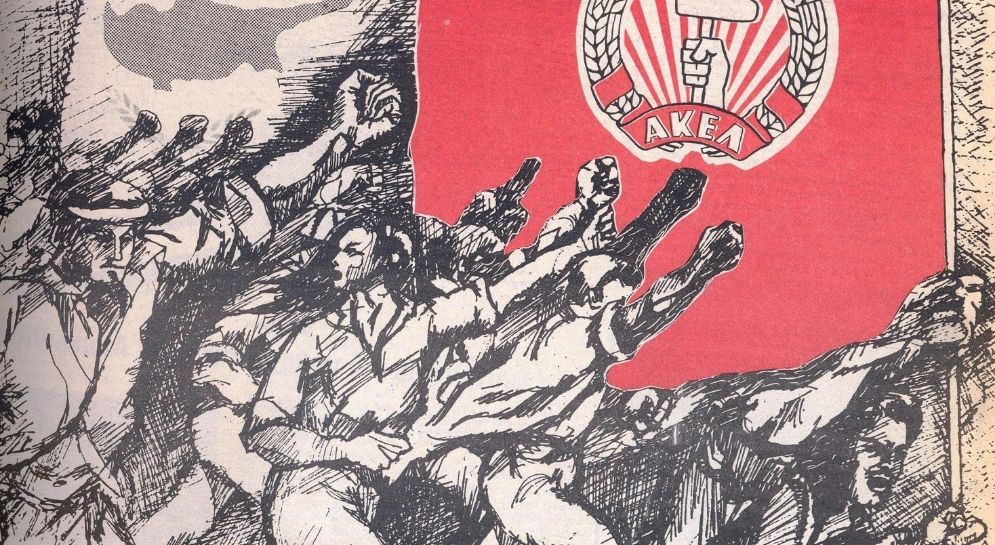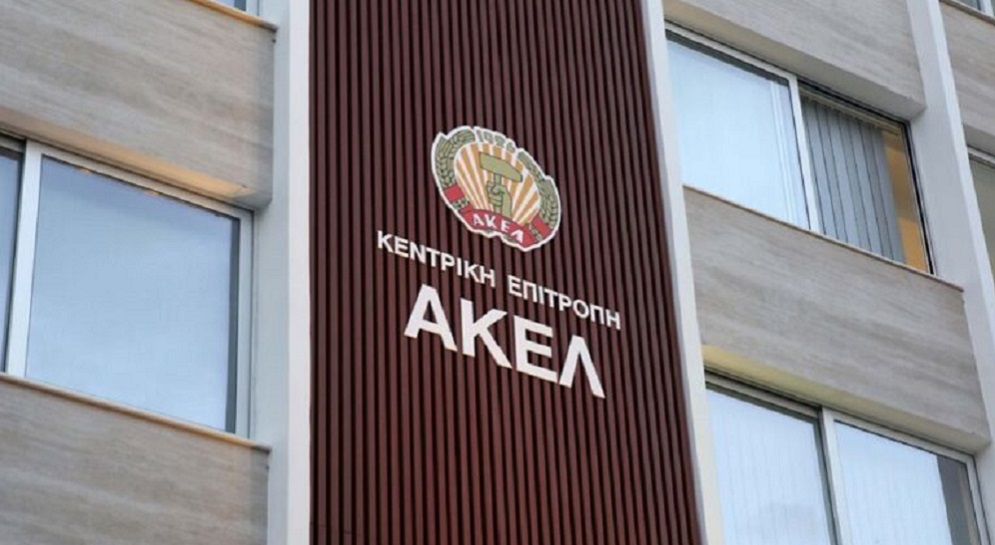
AKEL, born out of historical necessity
By Yiannakis Colokasides, member of the C.C. of AKEL, Historian
The founding of AKEL in April 1941 was by no means an accident. It was the very moment when “necessity becomes history”. It was the result and outcome of maturing conditions, so that the Communist Party of Cyprus (CPC) could hand over the baton of struggle to its successor. AKEL represented the successor of the CPC in the new conditions that had evolved in Cyprus in the early 1940’s.
The first communist cell in Cyprus appeared in the early 1920’s. The CPC held it’s founding Congress on August 15, 1926. For five years the young Party fought under extremely adverse conditions against British colonialism and the local oligarchy and reaction, promoting its ideology and visions, fighting for the organization and emancipation of the working people, struggling for the democratic rights of the people and the freedom of Cyprus.
On the occasion of the spontaneous people’s uprising in October 1931, the British colonialists attempted to exterminate the CPC and suppress the worker’s movement that was taking its first organized steps at the time. CPC militants and cadres were exiled both inside and outside of Cyprus. Persecutions, arrests, trials, imprisonment and torture. The CPC went through a very serious ordeal and was tested, but the Party didn’t dissolve. It continues to exist and fight. As the “Historical Encyclopedia of Cyprus” writes: “The activity of the communists was of particular concern to the colonial governor. Their activity was the only dissent voice opposing the government that had managed to impose itself… The other political faction, namely the Right, was content with appointments and other positions…”
Rise of the worker’s movement
In the middle of 1935 the CPC regrouped its forces. The Cypriot communists undertake the task of reviving the worker’s movement and put themselves at the forefront of the new class struggles. The worker’s movement as early as 1932 forces the British colonialism to enact the first law on trade unions. Despite the many reactionary provisions of that law, dozens of trade unions are gradually formed and become active. From just a few hundred members, by 1939 the trade unions had grown to 2,500 members.
In the second half of the 1930’s worker’s struggles were intensifying. Organized strikes were now a reality in Cyprus. The shoemakers ‘strike in 1935, the miners’ strike in 1936, four strikes in 1938 with the prominent strike of women workers in Famagusta. In 1939 we had the most important strike mobilization of that period. It was the construction worker’s strike that led to winning the eight-hour working day and to the first collective agreement.
The rise of the worker’s movement was evident. The soul of this movement are the members and militants of the illegal CPC. Every day the need for a political force that would operate more freely in conditions of legality became more and more imperative, in order to guide the growing socio-class and political struggles of the Cypriot working people. The foundation of AKEL responded precisely to this need.
The war changes conditions
Meanwhile, in September 1939, World War II broke out. An epic confrontation of life and death with Hitler fascism begins. The war changes everything in the world, including in tiny Cyprus, forgotten in the Eastern Mediterranean. The British – at war with the fascist Axis – need stability in their rearguard. They have even more need for support from even the oppressed peoples in their colonies. They therefore wear a liberal mask and relax/ease the oppressive measures everywhere in their colonial empire. The same occurs in Cyprus.
The new situation created by the war was made use of by Cypriot communists.
It should be noted that various figures from the ideological-political spectrum beyond the Left, such as the lawyers Pheidias Kyriakides and Yiorgos Vassiliades, in 1938 had already thought about establishing a “party of principles” in Cyprus. At some stage, these thoughts were shared with Ploutis Servas, General Secretary of the Communist Party of Cyprus, who, from another starting point and having a different goal in mind, was discussing the same possibility with his comrades.
These figures played a specific role in the foundation of AKEL, for which there is an extensive reference to in the “History of Cyprus” by Panayiotis Papadimitris.
The decision for the foundation of AKEL
The decision to establish AKEL was taken at the 4th Congress of the CPC, which took place in conditions of illegality in the spring of 1940 in Deryneia. Unfortunately, the materials of that historical congress have not been rescued. Lazaros Christofides, a member of the CPC who took part in that congress, in an interview with the writer, which he gave on May 23, 2002, stresses that AKEL was born at the 4th Congress of the CPC.
According to L. Christofides, Ploutis Servas raised the issue of the “Legalization of part of the Party’s activity” at the congress. He proposed that this legalisation could be done by creating a mass political organization under the leadership of the CPC. He based his proposal on two fundamental arguments.
The first is that during the conditions of World War II the British are forced to relax the repressive measures imposed during the autocratic and brutal colonial rule of Governor Palmer and tolerate the existence of political life in Cyprus.
The second is that in the run-up to the municipal elections (Νote: From 1940 the British colonialists began to discuss the possibility of permitting municipal elections to be held in Cyprus, which had been banned after the 1931 October riots) various figures will be active and interested in political life, among them people with progressive views, with whom the Left could cooperate with. Ploutis Servas concluded that the CPC should take advantage of both the new conditions to the benefit of the movement.
Ploutis Servas’ proposal reflected a practice that was applied by several Communist Parties all over the world when they found themselves banned and struggling in illegality. However, it did not cease to be a radical approach for the specific conditions of the Cypriot communist movement. In addition, this proposal sought to take advantage of the new situation brought about by World War II.
Servas’ proposal was met with skepticism. There was a lot of discussion, but in the end the General Secretary’s proposal was adopted, after it was clarified that this proposal approved would not mean the establishment of a new working class party, but instead a mass political organization, under the guidance and leadership of the Communist Party. The implementation of the decision was undertaken by a three-member committee consisting of Ploutis Servas, Christos Savvides (he was Servas’ brother) and Minos Perdios.
Servas, evidently also guided by his personal ambitions, quickly violated the decision in the sense that the party assembly was convened in Skarinou to create a party and not an organization. This surprised some CPC officials, including L. Christofides, who for that reason, as well as the fact that petty bourgeois elements were promoted to the leadership of the new party, refused to take part in the Skarinou assembly. Of course, the petty bourgeois elements, when they realized the true character of AKEL, as a Communist Party, quickly abandoned it.
Vindicated by History
Regardless of any personal motives on the part of Servas, the decision to establish AKEL, and then after 4 years the decision adopted to merge the CPC into AKEL, was a very important decision that was vindicated by history. Some former CPC militants who viewed with suspicion both the establishment of AKEL and the merger of AKEL and CPC, gradually understood that the necessary and correct decisions had been approved. In the interview we mentioned above, L. Christofides at an advanced age himself admitted: “I must say that the position I took then was not correct. Today I recognize that the Party that was necessary for Cyprus was AKEL and not the CPC. The CPC laid the foundations for the creation of the People’s Movement, but it is AKEL that developed the Movement because AKEL was rooted in Cypriot reality and conditions.”
Bicommunal and anti-fascist Party
The establishment of AKEL was announced with a simple proclamation. From that announcement two key points are of timeless importance. The first is a self-criticism that “we didn’t succeed in the Turkish component being represented in this (meeting)”. This shows that from the very beginning the intention was to establish not a Greek Cypriot party, but a Cypriot party that would embrace and express the working people of all communities in Cyprus. This is what AKEL to this day remains, a Cypriot party.
The second concerns the character and identity of the Party. The announcement underlined that AKEL has a “purely Democratic, Anti-Fascist and Anti-Hitlerite character, which is fully in line with today’s struggle against authoritarian rule and barbarity.” And this is precisely what AKEL remains today, in the vanguard in the anti-fascist struggle.




